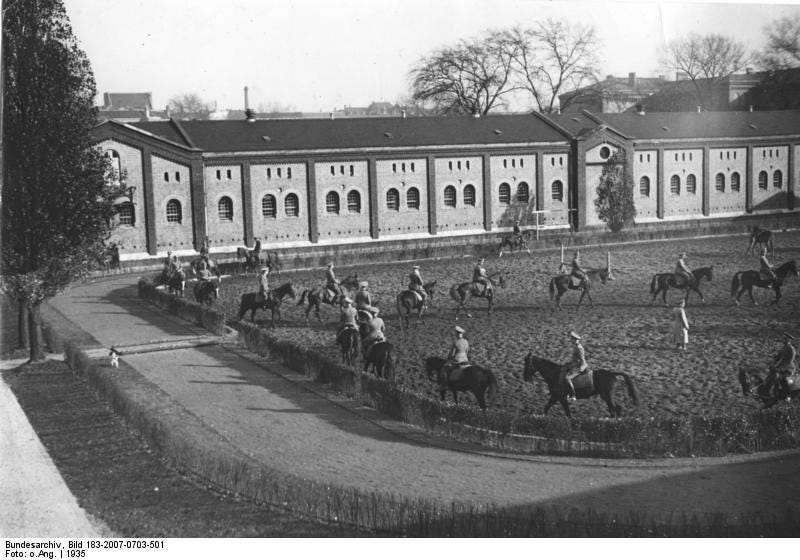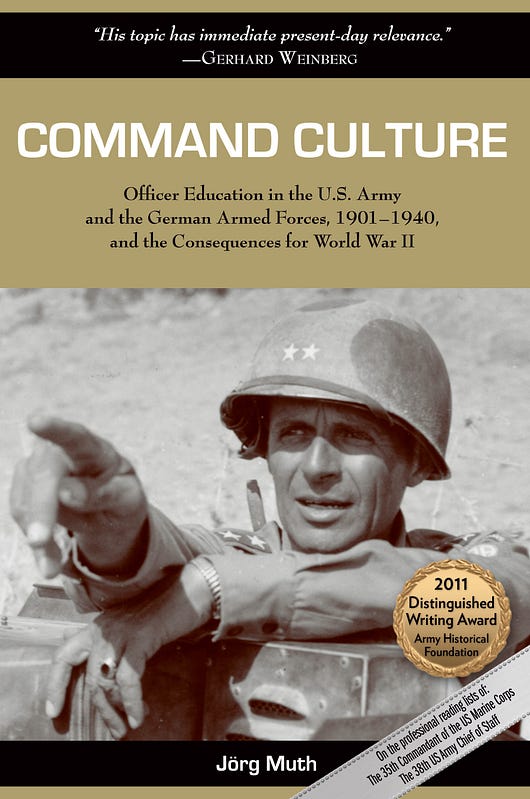This post was generously provided by Jörg Muth, PhD, the author of Command Culture: Officer Education in the U.S. Army and the German Armed Forces, 1901-1940, and the Consequences for World War II. Command Culture is on the professional reading lists of the US Army Chief of Staff and of the US Army Maneuver Center of Excellence. The Commandant of the Marine Corps made it required reading for all intermediate officers and all senior enlisted marines.
It seems that we now learn every week about new problematic conditions in the US Armed Forces and especially its officer corps: cheating during exams, sexual harassment on an unprecedented scale, revelations of toxic leaders, Generals who want to garnish their aides at all costs, mediocre faculty and harsh commanders at military schools, corruption in arms deals and supply procurement, and other ethical failures of officers and especially senior officers who abuse their privileges in myriad ways. When an encyclopedia of ethical failures can be created the situation is truly alarming. The lens has been focusing especially on Generals and many have asked correctly how an officer who has displayed such unacceptable behavior could ever have become a General in the first place. Why was he/she not sorted out as a Captain at the latest? Obviously, the whole system needs an overhaul, but no one seems to want to make the hard choices. The latter, however, is a true trait of outstanding leaders.
 Like 90% of all problems in an army this comes down to leadership, education, and selection. The knowledge of History really aids decision making, if people would only care to study it. As I have always told all my students in all my classes, in some of the first lectures: only fools learn by their own mistakes, smart people learn by the mistakes of others.
Like 90% of all problems in an army this comes down to leadership, education, and selection. The knowledge of History really aids decision making, if people would only care to study it. As I have always told all my students in all my classes, in some of the first lectures: only fools learn by their own mistakes, smart people learn by the mistakes of others.
Those who carry, perpetuate, and disseminate culture in an army are the senior commanders and the fixed installations, like military academies and schools. If the command culture and the ethical understanding of an officer corps need to be changed, it must begin at the academies. In the ingrained four-class system where hazing and denigration of younger cadets still happens, the first thing the younger cadets experience is the abuse of power. And it will be their turn to abuse next year when a new bunch of younger cadets arrive.
Why is the emphasis here on the academies and not the ROTC? Because the ROTC culture is much more affected by the culture of the academies than vice versa.
Fixed seniority should not exist because it is detrimental to a promotion system based on merit. Something like hazing should not exist because it violates the very foundations of comradeship. In the German military academies before the wars the younger cadets were protected by a system of fail safes against older bullies, and the upperclassmen were taught to help the younger ones succeed and not weed them out with immature torture measures. By showing exemplary behavior younger cadets could be promoted past older cadets, which sent the clear message that merit rules and that you really should not haze anyone because even as a cadet he might become your superior later. In the US Military academies the concepts of how to produce “leaders” are still connected to the 18th century where privilege ruled and it is therefore not surprising at all when those who learned to abuse their power as cadets will often behave in the same manner when they are Generals. Above all, leadership is best taught by example and that has to start when training officers. I predict that a change in leadership training at the academies would cut down the cases of sexual harassment in the US Armed Forces by at least half in several years. A course in ethics for a Colonel will help little because his command culture has already been established.
 Historically, armies with an officer corps that is greater in number than 10% of the enlisted will produce considerable command problems. Last year the US Army level was about 15.6%. The situation becomes worse in the highest ranks where Generals cling to their staffs and positions despite severe cuts in manpower. If the men must go, so must the Generals. In the past for a reduction of 50% in men only 15% of Generals were cut. An army suffers more from too many officers than from too few. In the latter case the NCO’s can and will step in as they have done in the past and the US Armed Forces are in the lucky position to have one of the most outstanding NCO-corps in the world.
Historically, armies with an officer corps that is greater in number than 10% of the enlisted will produce considerable command problems. Last year the US Army level was about 15.6%. The situation becomes worse in the highest ranks where Generals cling to their staffs and positions despite severe cuts in manpower. If the men must go, so must the Generals. In the past for a reduction of 50% in men only 15% of Generals were cut. An army suffers more from too many officers than from too few. In the latter case the NCO’s can and will step in as they have done in the past and the US Armed Forces are in the lucky position to have one of the most outstanding NCO-corps in the world.
Contemporary observers who critically watched the ballooning of the US Army officer corps in the interwar-period called that the rise of “staff command”. Officers would lose contact with the enlisted, would lose their empathy for them and their daily problems and instead focus on pleasing their superiors while dealing with paper and not with soldiers. The results can be seen today. An army is in deep trouble when an officer is not promoted because of “too much troop time”, as has happened in the US Army. US Army officer exchange students noted with surprise when they were enrolled at the famous German Kriegsakademie — the war academy — that even though the Kriegsakademie trained for higher staffs, every problem was approached as an example of ”troop leadership”.
 With an excess of officers, too many of them are occupied with polishing up for their next efficiency report instead of doing their job; this has been clearly expressed in surveys of enlisted men’s opinions about their officers in the US Armed Forces since WWII. Leadership is a deeply human endeavor and taking care of one’s subordinates should be one of the primary lessons during officer education.
With an excess of officers, too many of them are occupied with polishing up for their next efficiency report instead of doing their job; this has been clearly expressed in surveys of enlisted men’s opinions about their officers in the US Armed Forces since WWII. Leadership is a deeply human endeavor and taking care of one’s subordinates should be one of the primary lessons during officer education.
The Wehrmacht — the German Army of WWII — aimed for an officer corps of 3.5 % but because of the rapid rearmament and the following war casualties they never rose above 2%. During the war they proved that excellent staff work and frontline leadership was possible with such a low number of officers. Moreover, having a low number of officers made it possible to educate them individually, and not as in the current PME system of the US Armed Forces that instead produces officers in a factory-like fashion who “cooperate and graduate” and where there is a no-Major-left-behind mindset as my friend John Kuehn put it. The German system actively looked for mavericks and fostered them instead of putting them into positions of no promotion or phasing them out of the army. Mavericks are the only ones who speak up and criticize and who do the necessary out-of-the-box-thinking which is essential for the continued performance of every large organization.
The cancer is in the system when officers do not dare speaking up against misbehaving superiors because they fear for their own career. Therefore, enlisted who have been sexually harassed or otherwise mistreated don’t dare report it because they do not see superior officers as the guardians they should be, as the duty they owe their men and women.
The US Army currently tries to introduce the German command philosophy of Auftragstaktik — Mission Command — but still fails to understand the essentials of that system. One of them is empowered subordinates whose opinion is valued and who do not have to fear repercussions if they voice criticism against their superiors. The Prussian/German army struggled for 30 years with the introduction of this superior command philosophy and the US Army seems to be determined to make every single mistake the Prussian army made and add some of their own.
It is time the U.S. Armed Forces again assess their command culture.
No comments:
Post a Comment